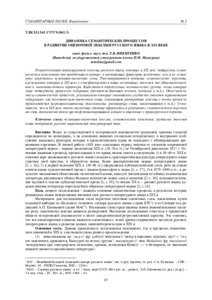Please use this identifier to cite or link to this item:
https://elib.psu.by/handle/123456789/21690| Title: | Динамика семантических процессов в развитии оценочной лексики русского языка в XIX веке |
| Authors: | Никитенко, Т. В. |
| Issue Date: | 2018 |
| Publisher: | Полоцкий государственный университет |
| Citation: | Вестник Полоцкого государственного университета. Серия A, Гуманитарные науки. - 2018. - № 2 – C. 87-92. |
| Abstract: | Ретроспективно анализируются лексемы русского языка, которые в XIX веке подверглись семантическим изменениям под воздействием внутри- и внеязыковых факторов, вследствие чего в их семантике закрепились негативно-оценочные семы. Рассматриваются основные семантические переходы, в результате которых в XIX веке у слов фиксируются новые негативные значения, как общеоценочного, так и частнооценочного характера. Выделяются определенные тематические группы, члены которых чаще подвержены процессам пейорации (предметно-бытовая лексика, зоонимы и т.д.). Отмечается, что в семантических процессах, результатом которых становилось ухудшение значения первоначально нейтрально- или положительно-оценочного слова, участвовали разнородные лексемы с точки зрения их происхождения (церковнославянизмы, диалектизмы, разговорные слова, заимствования и т.д.). Установлено, что в XIX веке многие оценочные единицы оформились в результате семантического переноса от слов, достаточно долгое время функционировавших в языке и известных с древнерусского периода.= The study considers evaluative lexemes of Modern Russian in a retrospective way which developed their pejorative meanings in the 19th century under the influence of linguistic and extralinguistic factors. The data was collected from the academic dictionaries of Modern Russian. The pejorative lexemes are represented by all notional parts of speech and by different topical domains. The main methods employed in the research are descriptive, contrastive, within which historical-semantic analysis is carried out, definitional, corpus analysis. The common semantic shifts are considered due to which the nineteenth-century words developed pejorative meaning. Some topical domains are studied that acquire negative sense development more easily. It is stated that the words which underwent semantic changes were of different origin (Church Slavic, dialectal, borrowings, spoken words, ect.). It has been found out that the majority of pejorative lexemes emerged as a result of semantic (frequently metaphorical) extension of the words which had existed in Russian for quite a lot of time. The driving force for appearing new negative meanings happened to be the formation of Modern Standard Russian in the first third of the 19th century. Besides, the formation of the publicist style along with the numerous coming out of social and political literature had a great impact on pejorative sense development. |
| Keywords: | Государственный рубрикатор НТИ - ВИНИТИ::ОБЩЕСТВЕННЫЕ НАУКИ::Языкознание Негативно-оценочная лексема Семантические изменения Ухудшение значения слова (пейорация) Русский национальный литературный язык Negatively-evaluated lexeme Semantic changes Pejorative sense development Russian standard language |
| URI: | https://elib.psu.by/handle/123456789/21690 |
| metadata.dc.rights: | open access |
| Appears in Collections: | 2018, № 2 |
Items in DSpace are protected by copyright, with all rights reserved, unless otherwise indicated.
